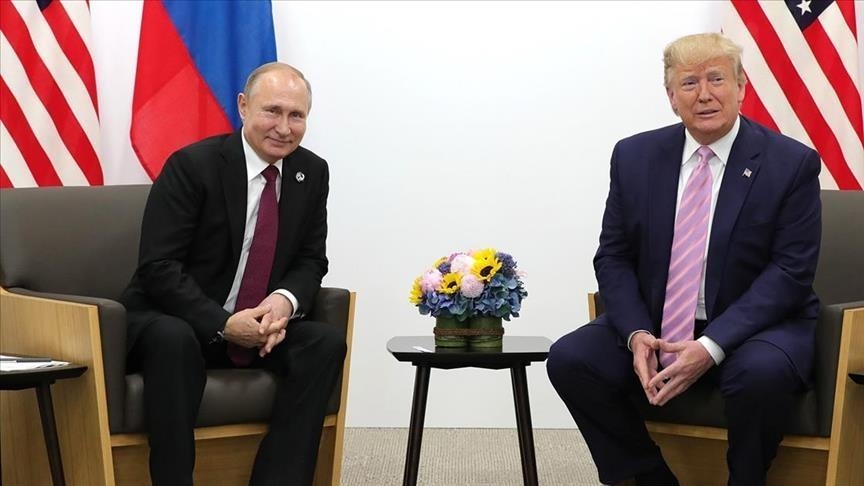Tactics and strategy: What is Putin seeking in summit with Trump?
Experts say Alaska summit offers Russia a chance to present its demands directly to US, including control over occupied Ukrainian territories and security guarantees that would reshape Kyiv’s future
 Russian President Vladimir Putin, US President Donald Trump
Russian President Vladimir Putin, US President Donald Trump
- Putin’s ideal outcome would be ‘a summit that will pay lip service to Trump’s ceasefire proposal, while extracting pledges for sanctions relief and resumption of economic ties,’ says San Diego State University academic Mikhail Alexseev
- ‘Russia wants to see Ukraine neutral and poorly armed’ and will also press for recognition of Crimea and territories creating a land corridor to it, says International Crisis Group’s Oleg Ignatov
ISTANBUL
When Vladimir Putin meets Donald Trump in Alaska on Friday, their presidential summit will mark the most high-profile US-Russia engagement since before the Ukraine war – and, experts say, a moment Moscow will try to turn into a strategic victory.
For the Kremlin, the summit offers a chance to present its demands directly to Washington: control over occupied Ukrainian territories and security guarantees that would reshape Kyiv’s future.
Even the act of holding the meeting – if it happens without Russia halting its bombardment – would be portrayed in Moscow “as a demonstration that it can outlast and outmaneuver the most powerful nation in the world and its president,” according to Mikhail Alexseev, a political science professor at San Diego State University.
“The Kremlin will have strong reasons to hope that it will demonstrate America’s weakness to the rest of the world, and thus, reduce US influence globally, for Russia to exploit it in years to come,” he added.
Eugene Chausovsky, senior analyst at the New Lines Institute, noted the broader significance: “This will be the first time that Trump will be meeting directly with Putin, and in fact the first time that any US president will have met with Putin for over four years, since before the start of the full-scale conflict in Ukraine.”
What is Russia’s agenda?
Oleg Ignatov, senior analyst for Russia at the International Crisis Group, believes Moscow will focus on two priorities: control over territories and security.
“Ukraine wants its territories and security guarantees. Russia wants to see Ukraine neutral and poorly armed,” he explained, adding that Putin is likely to press for recognition of Crimea and territories creating a land corridor to it.
Chausovsky said Ukraine’s neutrality will be a central discussion point: “Putin would be looking to achieve Ukraine’s neutrality or removing NATO membership prospects, which arguably has already been achieved, especially with the Trump administration sort of distancing itself from the previous administration on that front.”
According to him, Russia will also push for reduced Western, US, and EU military and financial support for Kyiv, alongside concessions on the four Ukrainian regions it annexed in late 2022 – Donetsk, Kherson, Luhansk, and Zaporizhzhia.
Moscow will also seek relief from economic sanctions, according to experts. “Not only the sanctions, but now also this threat of secondary tariffs for countries like India – and potentially even China – for importing Russian oil,” Chausovsky said.
“That would be very damaging to those countries for sure, but also for Russia economically.”
End to war: What will Russia demand?
Analysts say all sides want strong guarantees the war will not resume, but compromise will be difficult.
Alexseev believes that Russia “is not going to change its demands for Ukraine to cede all Russia-occupied territories, for other countries to recognize those territorial gains, and for Ukraine to essentially give up its sovereign right to decide on how much military power it can have and what alliances it can join.”
He added that Putin’s ideal outcome would be “a summit that will pay lip service to Trump’s ceasefire proposal, while extracting pledges for sanctions relief and resumption of economic ties.”
Ignatov raised questions over how Washington will coordinate with Ukraine and Europe, and whether allies will accept any deal reached in Alaska.
“Perhaps after the meeting between Putin and Trump, if it is successful, there will be a meeting between Trump and (Ukraine President Volodymyr) Zelensky, or Trump, Putin and Zelensky, and then we will see a second or even third stage of negotiation,” he said.
However, he warned that the process could stall or break down at any stage due to mistrust between the parties, but asserted that compromises are possible.
Chausovsky pointed out that both Trump and Zelensky have expressed readiness for a meeting, but the Russian side remains “hesitant.”
“They don’t want to have that level of a summit until a ceasefire agreement is in place, or at least a framework of a deal.”
Anadolu Agency website contains only a portion of the news stories offered to subscribers in the AA News Broadcasting System (HAS), and in summarized form. Please contact us for subscription options.







